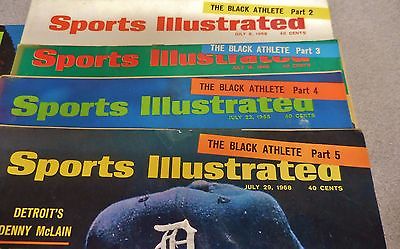Sports Illustrated from July 1, 1968 included feature content about Black athletes, called "The Black Athlete: A Shameful Story." The July 1 issue was the first installment of a five-part series by Jack Olsen. Part 1 is titled "The Cruel Deception" and investigates the notion that sports was the most progressive national arena for positive race relations and opportunity for black youth in mid-twentieth century. Olsen uncovers the many fallacies of this concept by exploring the realm of collegiate athletics. He delves into the social and academic struggles that arise as black youth matriculate into predominantly white universities to play sports, discussing everything from money management, dating, and coursework. The feature draws on the voices of black athletes themselves as they discuss their grievances, their athletic performance, their public activism, and their experience of race in sports. Many of the athletes interviewed were nationally recognized, some professional. Olsen's other interviews ran the gamut from sociologists, to black community leaders, to white athletic directors and coaches. Sports Illustrated deemed this long form essay one of its most important features, and an uncharacteristic dive into the tense racial cauldron of the United States. However, the piece was notably geared only toward white readers. Olsen's language and positioning throughout the piece are telling of audience demographic; he often implies the separation of his readers--and himself--from black communities and the issues they face, in sports and otherwise. Olsen also often identifies as white and acknowledges white cultural ideology, even as he challenges it. The ads embedded in the pages of the story are even more striking. The ads feature only white people, and these figures are usually engaging in traditionally 'white' cultural practices like deep sea fishing and skiing. The feature archived in this collection reveal the ways in which Sports Illustrated used athletics as a context in which to discuss racial tension and oppression with a white readership.
